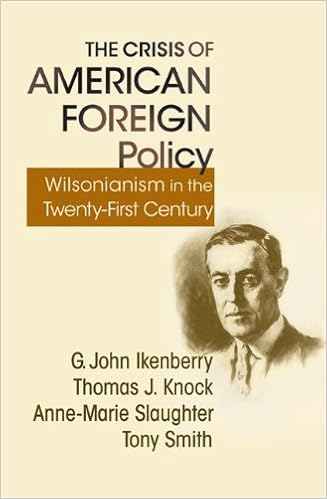This book of three essays and an introduction looks at the meaning of Wilsonianism in the twenty-first century--that is, namely in light of the war in Iraq. My interest in this book came about from a review I read about a year ago. Then, George W. Bush was still in power, and it still felt a little relevant. Reading the introduction (which relates the three essays) and the first essay (mostly on the history of Wilson's foreign policy and his attempts to build the League of Nations and his goals in doing so), I wondered to an extent just how relevant the book still was. So much of those sections seemed focused on the decisions of the Bush administration and on whether those qualify as Wilsonianism that it hardly seemed to apply to decision-making today.
Enter Thomas J. Knock's essay, wherein he ties two traditions together--Woodrow Wilson's conceptions of foreign policy (founding what Knock calls neoliberalism) and neoconservatism. Knock argues that they are more or less two sides of the same coin, with a goal of democratizing the world and thus providing for world peace (since mature democracies supposedly don't go to war against one another). The key difference is in focus--multilateralism versus unilateralism. In one, the United States does this in consort with other countries; in the other, the United States goes it alone. Yet, Knock argues, these aren't as different as they appear. Both have at heart protecting American interests abroad. In one America acts for the good of the world, which in turn helps America; in the other, America gets the world to act the way America wants for the good of America.
Anne-Marie Slaughter goes on, in the last essay, to rebut each of Knock's arguments, reconfiguring Wilsonianism as a set of policies that respects self-determination of peoples and that would never act unilaterally to achieve desired ends. At her essay's end, she looks to Europe as the exemplar of Wilson's dream, a set of nations who have voluntarily ceded some sovereignty in order to set united goals and thus to sustain peace. It is to this, she says, the United States should aim in its own actions with the world, integrating more with such a system.
It is a persuasive argument, insofar as Knock's own essay ends with a lament, one that seemed wholly appropriate given the first two essays in the book and the foundation for much of the neoconservative argument (and the neoliberal for that matter). That argument rests in the assumption that the United States is the most powerful nation on the planet--militarily and economically. In the face of two wars, a financial crisis largely brought upon the world by the nation's profligate personal spending, and further profligate national spending necessary to recover from--or postpone--the looming disaster caused by the first two, however, claims of American power as supreme in the world seem hollow. How the nation continues in light of these problems would seem to demand the country no longer look to itself as the savior--or ruler--of the world but as one of the company of nations.
Friday, December 4, 2009
On "The Crisis of American Foreign Policy" by G. John Ikenberry, Thomas J. Knock, Anne-Marie Slaughter, and Tony Smith ****
Subscribe to:
Post Comments (Atom)







No comments:
Post a Comment